Advertisements
Advertisements
प्रश्न
In the figure, given below, AB, CD and EF are parallel lines. Given AB = 7.5 cm, DC = y cm, EF = 4.5 cm, BC = x cm and CE = 3 cm, calculate the values of x and y.
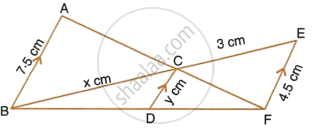
उत्तर
i. In ΔACB and ΔFCE, we have
∠ACB = ∠FCE ...(Vertically opposite angles)
∠CBA = ∠CEF ...(Alternate angles)
∴ ΔACB ∼ ΔFCE ...(AA axiom of similarity)
Thus their corresponding sides are proportional.
∴ `(AB)/(BC) = (EF)/(EC)`
`\implies (7.5 cm)/(x cm) = (4.5 cm)/(3 cm)`
`\implies x = ((7.5 xx 3)/4.5) cm`
= `225/45 cm`
= 5 cm
ii. In ΔEBF and ΔCBD, we have
∠B = ∠B ...(Common angle)
∠EFB = ∠CDB ...(Corresponding angles)
∠BEF = ∠BCD
∴ ΔEBF ∼ ΔCBD ...(AA axiom of similarity)
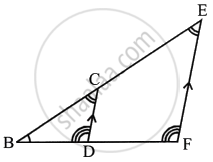
Thus, `(EB)/(CB) = (EF)/(CD)`
`\implies (EC + CB)/(CB) = (4.5 cm)/(y cm)`
`\implies (3 + x)/x = 4.5/y`
`\implies ((3 + 5) cm)/(5 cm) = 4.5/y`
`\implies y = (4.5 xx 5)/8`
= `45/16 cm`
= `2 13/16 cm`
APPEARS IN
संबंधित प्रश्न
In figure, ABCD is a trapezium with AB || DC. If ∆AED is similar to ∆BEC, prove that AD = BC.
In the given figure, AB and DE are perpendicular to BC.
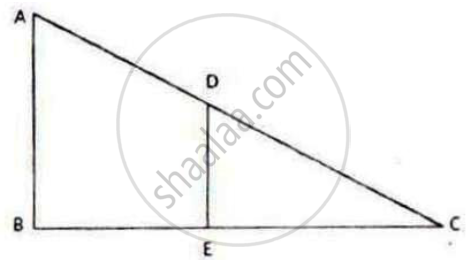
1) Prove that ΔABC ∼ ΔDEC
2) If AB = 6 cm; DE = 4 cm and AC = 15 cm. Calculate CD.
3) Find the ratio of area of ΔABC: area of ΔDEC
In the given figure, QR is parallel to AB and DR is parallel to AB and DR is parallel to QB.
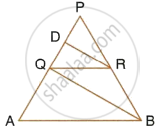
Prove that: PQ2 = PD × PA.
In a circle, two chords AB and CD intersect at a point P inside the circle. Prove that
(a) ΔPAC ∼PDB (b) PA. PB= PC.PD
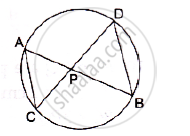
ΔABC~ΔDEF and their areas are respectively 64 cm2 and 121cm2. If EF = 15.4cm, find BC.
Are the triangles in the given figure similar? If yes, by which test?
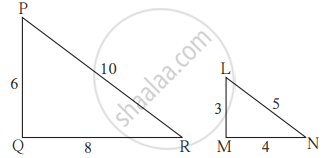
In figure , DEF is a right -angled triangle with ∠ E = 90 °.FE is produced to G and GH is drawn perpendicular to DE = 8 cm , DH = 8 cm ,DH = 6 cm and HF = 4 cm , find `("Ar" triangle "DEF")/("Ar" triangle "GHF")`
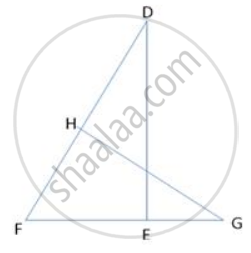
If ∆ABC ~ ∆DEF such that area of ∆ABC is 9 cm2 and the area of ∆DEF is 16 cm2 and BC = 2.1 cm. Find the length of EF.
If ΔABC ~ ΔLMN and ∠B = 40°, then ∠M = ? Give reason.
Prove that if a line is drawn parallel to one side of a triangle intersecting the other two sides in distinct points, then the other two sides are divided in the same ratio.
Using the above theorem prove that a line through the point of intersection of the diagonals and parallel to the base of the trapezium divides the non-parallel sides in the same ratio.
